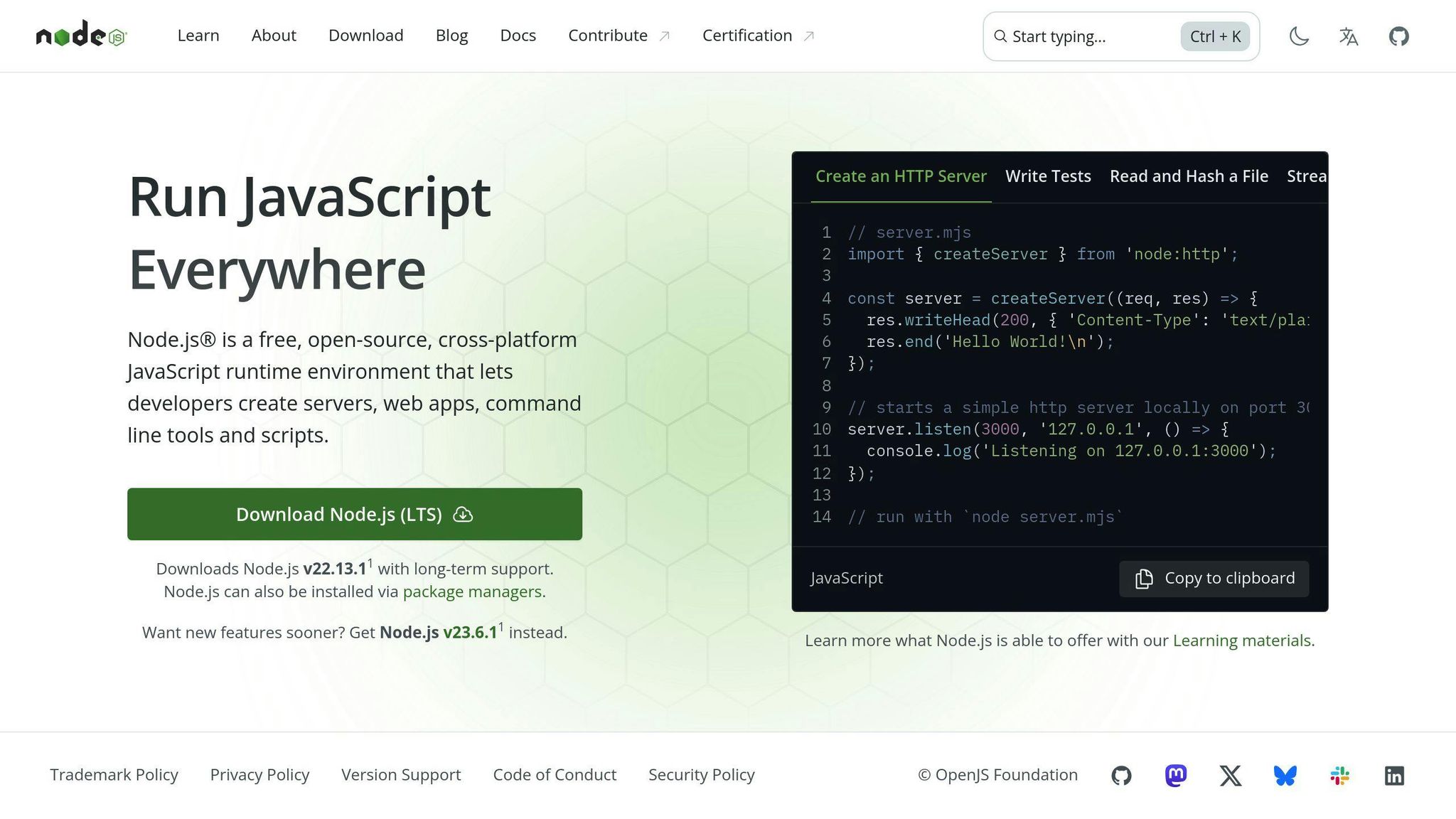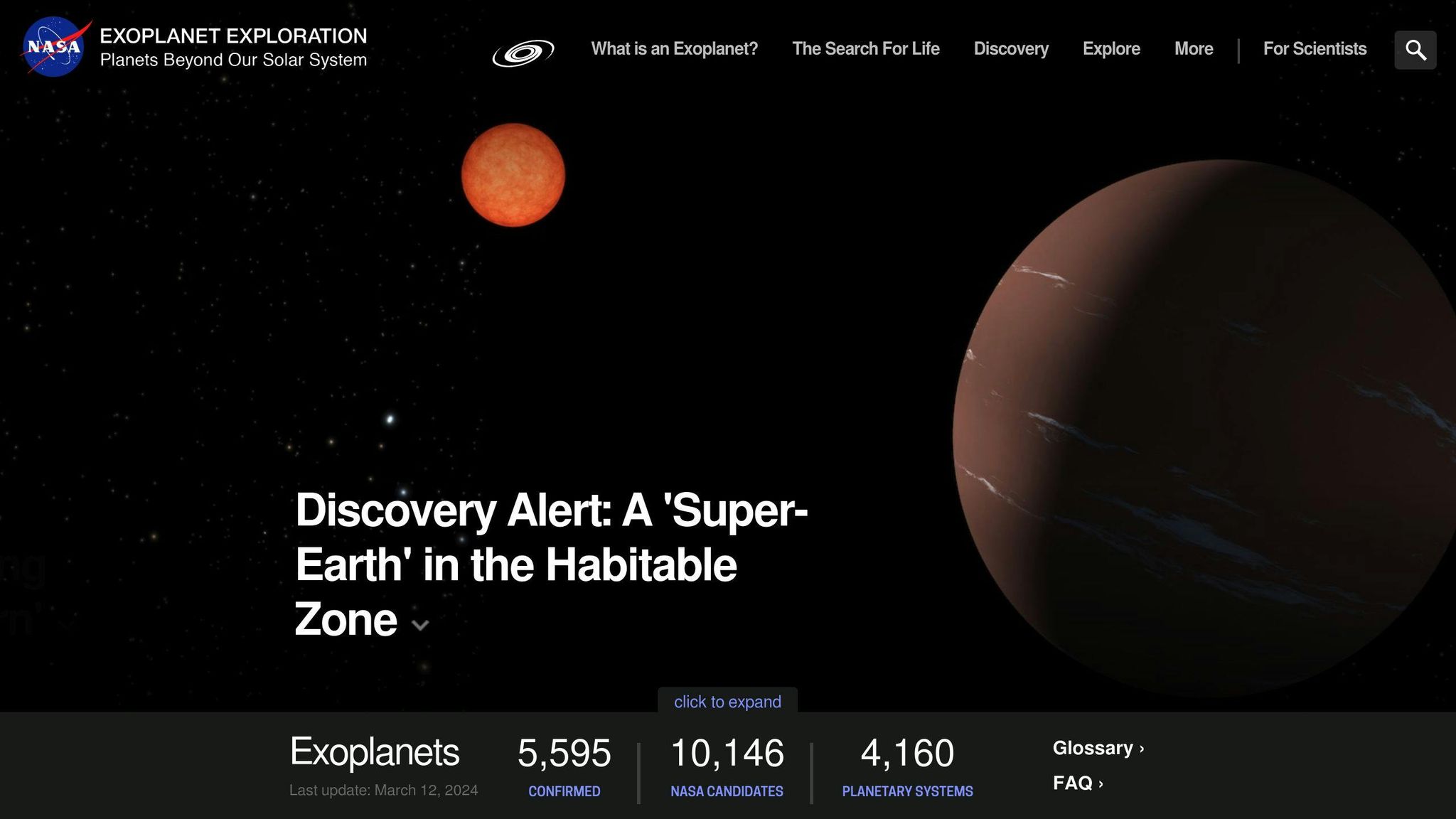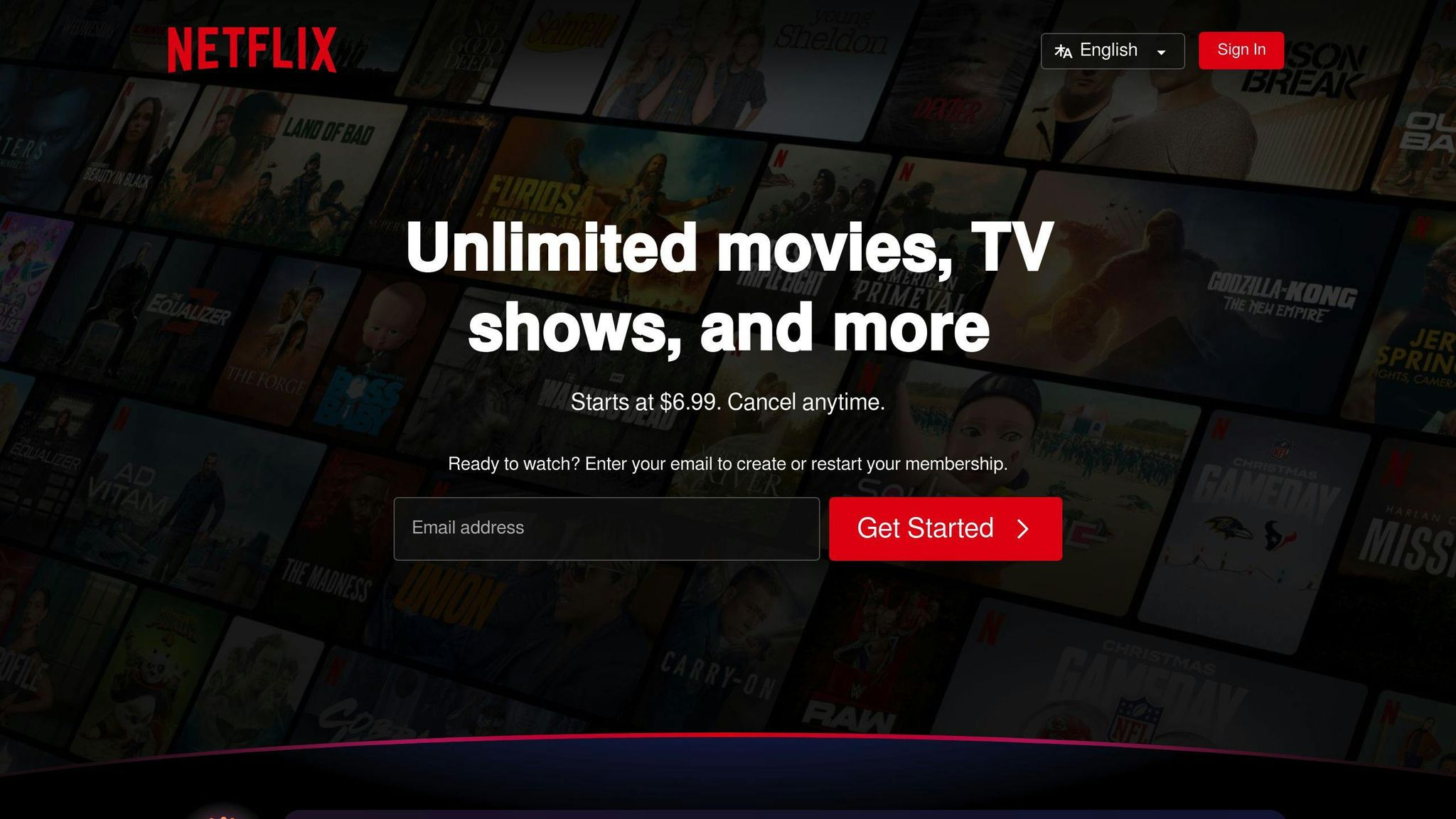


Learn about Node.js, its community, how to get involved, collaborate, and build projects. Explore resources, workshops, and the future of Node.js.
If you're curious about Node.js and its vibrant community, here's what you need to know in simple terms:
- Node.js is a tool for running JavaScript outside the web browser, ideal for real-time web apps like chat apps.
- It's become popular because it allows using JavaScript for both frontend and backend, with companies like Netflix and eBay using it.
- The Node.js community is global, offering events, workshops, and online discussions for collaboration and learning.
- Getting involved is easy with platforms like GitHub, social media, and by attending or contributing to NodeSchool workshops.
- For learning, official resources and community platforms offer guidance, while collaborating with others can enhance understanding.
- Node.js is suitable for a wide range of projects, from small tools to large applications, with big names like NASA and Netflix utilizing it.
- Future updates will continue improving Node.js, focusing on diagnostics, multi-threading, international support, and more.
This introduction aims to give you a quick overview of what Node.js is, why it's popular, and how you can start learning and contributing to its community.
The Rise of Node.js

In the last ten years, Node.js has become really popular. Big companies like Netflix and eBay use it because it lets them use JavaScript for both the front-end and back-end, making things faster and easier to manage. Here's why it's gotten so big:
- It lets you use JavaScript for server tasks.
- It has a strong community that keeps making it better.
- You can build things faster by reusing code.
- It works well for splitting your app into smaller, easier-to-manage pieces.
- There are tons of tools and libraries available for it.
The Vibrant Node.js Community
Node.js has a big, worldwide community of people who help make it better. This includes folks working alone, as well as big companies like Google. They all pitch in to improve Node.js.
Here are some ways the community comes together:
- Events like NodeConf EU.
- Groups like the OpenJS Foundation that help manage Node.js.
- Teams that work on Node.js itself.
- Online places to talk, like the Nodeiflux Discord.
- Workshops and lessons through NodeSchool.
This community is all about working together and sharing knowledge about Node.js. People can help out by adding to the discussion, working on projects, or sharing what they know.
Getting Involved
Joining the Discussion
The Node.js community talks and shares a lot online. Here are some good places to join in:
- GitHub - The Node.js organization has the main Node.js stuff and more. You can help by reporting problems or suggesting ideas.
- IRC channels - Channels like
#node.jsand#nodejson Freenode are where people chat about Node.js stuff live. - Twitter - Follow @nodejs and use the #nodejs hashtag to keep up with what's happening.
- Newsletters - The Node.js Weekly and Node Module Of The Week share the big news and cool things from the community.
- Events - Going to events like NodeConf EU is a great way to learn, meet others, and share your ideas in person.
Contributing to Open Source
If you're new to helping out with open-source projects, here's how to start with Node.js:
- Fork the project you want to help with, like the Node core. This means you make your own copy to change.
- Clone your copy to your computer with Git.
- Start a new branch in your copy for your changes.
- Change the code to fix an issue or add something new.
- Test your changes well to make sure they work right.
- Commit your changes with clear messages about what you did.
- Push your changes to your copy online.
- Pull request so the main project people can look at your work and maybe add it to the project.
Look for issues marked "Good First Issue" or ask in community spots if you need help getting started!
Collaborating on Node.js Workshops
NodeSchool workshops are easy lessons on Node.js you can follow along with. People who know Node.js well help out as mentors.
Here's how you can join in:
- Take a workshop to get better at Node.js with others.
- Organize a local event to learn hands-on and help others.
- Contribute to the workshop's materials by making them better or adding translations.
- Become a mentor to answer questions and guide people during the workshop.
Workshops are a friendly way to start with Node.js projects and meet people nearby who are learning too.
Learning and Development
Official Resources
The best places to start learning about Node.js are the official guides and interactive lessons on NodeSchool.io.
- The API docs are like a detailed instruction manual for Node.js. They cover everything from the basics to more advanced topics like security and debugging. It's a go-to resource for understanding how Node.js works.
- NodeSchool.io offers a fun, hands-on way to learn by solving coding puzzles right in your terminal. You'll work through different lessons, such as LearnYouNode and Stream Adventure, and earn cool stickers as you complete them.
These resources give you a strong start in Node.js, mixing detailed guides with practical coding exercises.
Asking Questions
When you're stuck, here are some places to find help:
- Stack Overflow - It's the biggest site for programming questions. Make sure to use the node.js tag when you ask about Node.js. Describe your problem clearly and mention what you've tried.
- The DEV Community - Here, developers share their questions and experiences. Look through what others have asked or post your own question.
- Nodeiflux Discord - For quick, chat-based help, this Discord server has special channels for Node.js help where you can share code and get advice.
These community spots are great for getting through tough spots and learning from others.
Collaborative Learning
Learning with others can really help make things stick:
- Code Reviews - When you contribute code to open-source Node.js projects, other developers can give you feedback. This is a great way to learn from those with more experience.
- Meetups & Events - Going to local or international Node.js events is a great way to meet other developers, learn from talks and workshops, and share ideas. Events like NodeConf EU are perfect for this.
- Teaching - Helping out at NodeSchool workshops or teaching others about Node.js can really strengthen your own understanding.
Joining in with the Node.js community helps you learn faster by sharing knowledge and working together.
Building with Node.js
Node.js is really good at making all sorts of apps, from small ones to big, important ones. People who like to share and work together on coding projects find Node.js especially handy.
NASA Eyes on Exoplanets

NASA uses Node.js and another tool called React to make a cool web app that shows us planets beyond our solar system. This shows how Node.js can handle live updates and show lots of data in a way that's easy for everyone to understand. The app gets its info from different places and puts it all together in a fun, interactive way.
Netflix

Netflix started using Node.js a while back because it made it easier for their team to work with JavaScript for everything. Node.js helps them update and add new features faster. Now, Netflix uses Node.js for important jobs like suggesting what you might like to watch next.
Project Concepts
Node.js is really good for:
- Real-time applications - Like chat apps, things that show live data, and gadgets that connect to the internet
- Data-intensive services - Like websites that handle a lot of information, grabbing data from the web, and organizing data
- High traffic sites - Like websites for watching videos, online shopping, and social media
- Command-line tools - Like programs that help developers automate tasks
- Hybrid apps - Like apps that work on both phones and computers
For practice, you could try:
- Making a simple program that tells you the weather using live data
- Building a website that tracks stock prices with cool charts
- Creating a chatbot for Discord that can do fun things
- Pulling information from a website and sharing it through your own web service
- Developing a learning app with flashcards that helps you remember things better
The Node.js community is all about sharing code, helping each other, and working together on projects that make a difference.
sbb-itb-bfaad5b
The Road Ahead
Upcoming Releases
Node.js keeps getting updated every six months. Here's what's coming in versions 21, 22, and beyond:
- They're making a tool called the diagnostics channel better. This tool helps check on your code and find problems without slowing things down.
- They're improving something called worker threads. This makes your code do multiple things at the same time more efficiently.
- They're adding more support for different languages and regions through something called ECMA-402. This makes Node.js work better for people all over the world.
- They're making the cluster module more reliable. This is important when you're using Node.js for big projects.
Paradigm Shifts
As the JavaScript language gets new features, Node.js will too:
- Top-Level Await - This lets you use 'await' outside of special 'async' functions, making it easier to write certain types of code. It should be part of Node.js soon.
- ESM Import/Export - Node.js is working on using the same way to include bits of code that web browsers do. This is a big change that's still in progress.
- Future JS Versions - Node.js plans to keep up with the latest JavaScript features to make coding easier and more powerful.
Community Priorities
The people who help shape Node.js have some big goals:
- Documentation Expansion - They want to make more official guides, especially for parts of Node.js like the stream module and core libraries.
- Inclusivity - They're working on making Node.js welcoming for everyone, no matter where you're from or how new you are to coding.
- Security - They're focusing on finding and fixing security problems faster with the help of a group called the Node.js Security Working Group.
- Education - They're adding more workshops and learning materials to help people get started with Node.js.
Conclusion
The Node.js community is full of active and passionate people who are all about making Node.js better. They use places like GitHub, Twitter, and events to share what they know, help each other out, and make the platform even better.
Here's how you can join in:
- Get involved in online chats or forums about Node.js
- Help improve Node.js by working on projects with others
- Run or go to workshops like NodeSchool to learn more
- Share what you know and learn from others through things like code reviews and local meetups
Looking ahead, here are some important things for Node.js:
- Making more guides and help documents
- Making sure everyone feels welcome
- Keeping Node.js safe and secure
- Creating more ways for people to learn about Node.js
New updates to Node.js will include:
- A tool that checks your code better
- Making it easier for your code to do several things at once
- Supporting more languages from around the world
- Making big projects run smoother
As the way we use JavaScript changes, Node.js will too, with new features like being able to wait for something without needing special functions and a new way to use bits of code from different places.
With the help of individuals, companies, and groups like the OpenJS Foundation, Node.js keeps getting better. It's a welcoming place for developers of all levels to learn, make things, and come up with new ideas using Node.js.
Related Questions
Is learning node worth it?
Yes, learning Node.js is definitely a good idea. Here's why:
- Node.js is super quick for making apps that need to update in real-time, like chat apps.
- You can use JavaScript for both the stuff you see on a webpage and the behind-the-scenes server work, which means you can do more with what you already know.
- There's a ton of ready-to-use tools and codes available for free.
- Big companies like Netflix and PayPal use Node.js because it's reliable and can handle a lot of users at the same time.
- Knowing how to use Node.js can make you really attractive to employers since it's in high demand.
So, learning Node.js can open up lots of opportunities for you as a developer.
Why is Node.js so popular?
Node.js is really liked because:
- It lets websites talk back and forth with users instantly.
- It's built to handle lots of work without getting slow, which is great for apps that have a lot of users.
- You can use the same coding language for both the website's front end and the server, making things easier and faster to build.
- There's a huge choice of extra tools and codes you can add on easily.
- It's free and has a lot of people constantly making it better.
These reasons have made Node.js a go-to for creating efficient and fast web apps.
Is Express a framework or library?
Express is a framework for Node.js, not just a simple library. It helps you do a bunch of web server tasks more easily, like:
- Sending users to the right part of your website.
- Working with different web page templates.
- Managing requests from users and responses from the server.
- Setting up security and managing user sessions.
So, Express is like a toolkit that helps you build web servers quickly and easily with Node.js.
Is Node.js good for large applications?
Yes, Node.js can be great for big apps because it's designed to handle a lot of work smoothly. But, when building big apps, you need to:
- Make sure errors are caught and dealt with properly.
- Use caching to save time and resources.
- Consider splitting your app into smaller parts to make it easier to manage.
- Always test your app and keep an eye on how it's doing to catch any problems early.
With the right approach, Node.js can help you build and run big, complex apps effectively.

.png)








